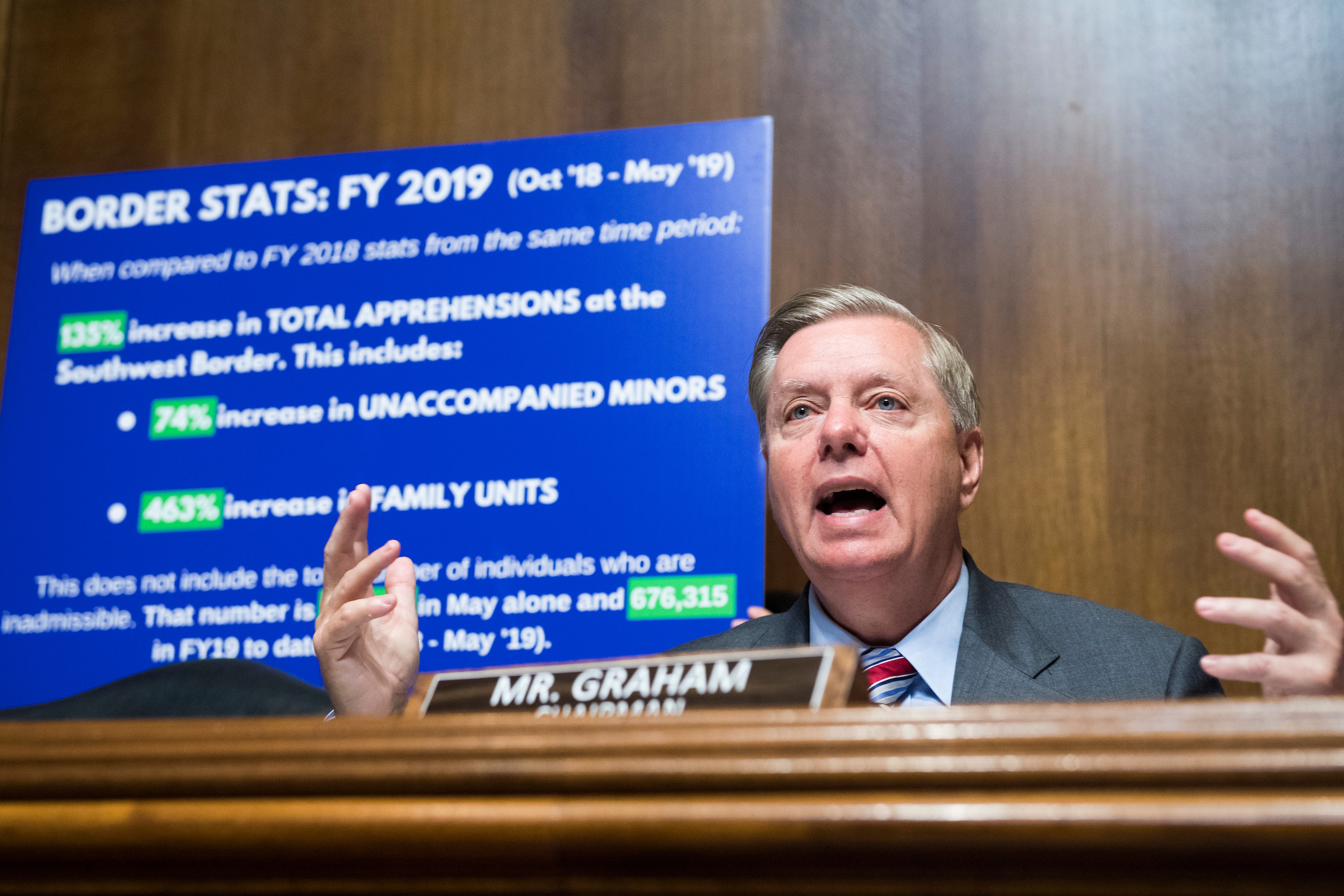Road Ahead: Border supplemental talks could overshadow regular appropriations
Senate to begin NDAA debate while House votes on first fiscal 2020 spending package

Congressional leaders are hoping this week will produce a breakthrough in negotiations over emergency funding for the migrant crisis at the southern border so they can pass it before the Independence Day recess.
President Donald Trump has requested Congress pass a $4.5 billion supplemental to help the Department of Homeland Security process the growing number of migrants trying to cross the U.S.-Mexico border.
Democrats say they’re willing to provide more funds for humanitarian needs related to housing the migrants while they’re being processed, but they do not want to provide additional money for immigration enforcement in the supplemental. Republicans’ willingness to back off their enforcement demands may be the key to a deal.
Senate Majority Leader Mitch McConnell made clear Monday that if there is no bipartisan agreement this week, he would be calling a standalone vote on the border aid supplemental appropriations before the Fourth of July recess.
The Kentucky Republican, appearing in studio on “Fox & Friends,” reiterated that his conference wanted the funding included in the recently-enacted emergency supplemental for disaster relief.
“In the Senate, we wanted to add to it the roughly $5 billion the president’s requested to deal, not with the wall, but just the humanitarian part of the crisis at the border. The Democrats insisted on stripping it out,” McConnell said. “So, I’m going to bring it up free-standing next week, and see if they if really aren’t interested in dealing with this mass of humanity that we have to take care of at the border.”
Until an agreement is reached, the House will likely have another slog of a work week if the chamber’s floor drama last week was any indication.
Republicans used procedural delay tactics to protest inaction on Trump’s border funding request, including forcing roll call votes on every single amendment to the four-bill appropriations package the House debated last week.
Debate on that package will continue this week, with Republicans expected to continue forcing roll call votes on amendments.
There are still 221 amendments pending to the package, which contains the fiscal 2020 Defense, Labor-HHS-Education, Energy-Water and State-Foreign Operations bills.
The House is expected to work through the amendments and vote on final passage of that package and then begin debating their next fiscal 2020 spending package, which includes five bills: Commerce-Justice-Science, Agriculture, Interior-Environment, Military Construction-VA and Transportation-HUD.
The Senate is going to do some legislating this week as well — after spending most of the year so far on confirming nominations. It begins debate Tuesday on its version of the fiscal 2020 National Defense Authorization Act.
The House reported its version of NDAA out of committee last week. The two differing bills provide plenty of opportunity for conflict, with House Democrats and Senate Republicans floating different top-line defense spending levels and the latter seeking to use Pentagon funds for a border wall.
One of the hot spots in the Senate debate will be war powers on Iran. A group of Senate Democrats, joined by Kentucky Republican Rand Paul, plan to offer an amendment to block funds for military action against Iran without congressional authorization.
Committee action
Senate committee business will be relatively light this week, though a Tuesday morning Finance panel hearing is sure to be an exception.
U.S. Trade Representative Robert Lighthizer is expected to testify on the proposed new trade agreement with Canada and Mexico, just ahead of a visit to Washington by Canadian Prime Minister Justin Trudeau.
The hearing will also address the Trump trade agenda at large, and senators from both parties are sure to press Lighthizer on China trade policy.
Lighthizer is likely to face similar questions when he testifies Wednesday before the House Ways and Means Committee on the 2019 trade agenda. Democrats on the panel will probably press him on reopening the United States-Mexico-Canada Agreement to add enforcement provisions.
Another notable Wednesday hearing is the latest in a series looking into the Boeing 737 MAX jet. The House Transportation and Infrastructure Aviation Subcommittee will hear stakeholder input on the problematic plane, including testimony from Chesley “Sully” Sullenberger, known for landing an Airbus jet on the Hudson River to save it from crashing due to engine failure.
Cannabis advocates will flock to the House Small Business Committee on Wednesday as the panel examines economic opportunities for small businesses in states where marijuana is legal.
Thursday’s hearing highlights in the House include the Homeland Security Border Security, Facilitation and Operations Subcommittee examining the administration’s deployment of troops to the U.S.-Mexico border; the House Administration Committee overseeing Congressional Research Service operations; and the Modernization of Congress Select Committee discussing cultivating diversity and improving retention of congressional staff.
The top televised hearing of the week, however, is likely to come Thursday when the House Judiciary panel holds its second in a series of hearings on lessons from former special counsel Robert S. Mueller III’s report.
The panel will also get press attention Wednesday when former White House Communications Director Hope Hicks sits for a transcribed interview behind closed doors to share information she provided to the special counsel about her time working on Trump’s 2016 campaign. She is not expected to discuss matters from her time in the White House because of Trump’s executive privilege claims.
Erin Bacon and Niels Lesniewski contributed to this report.





